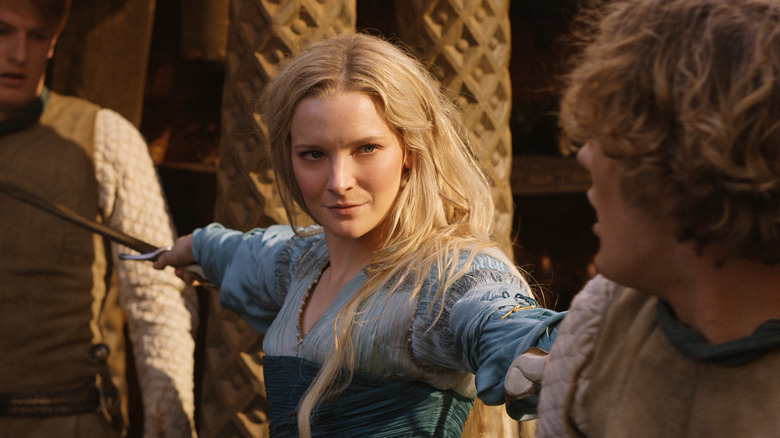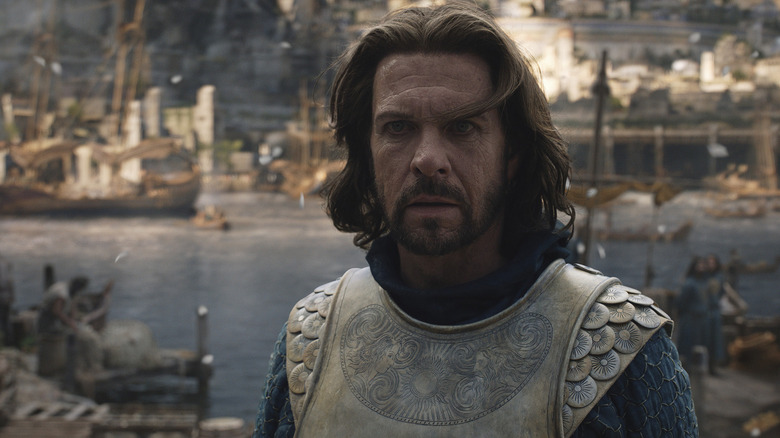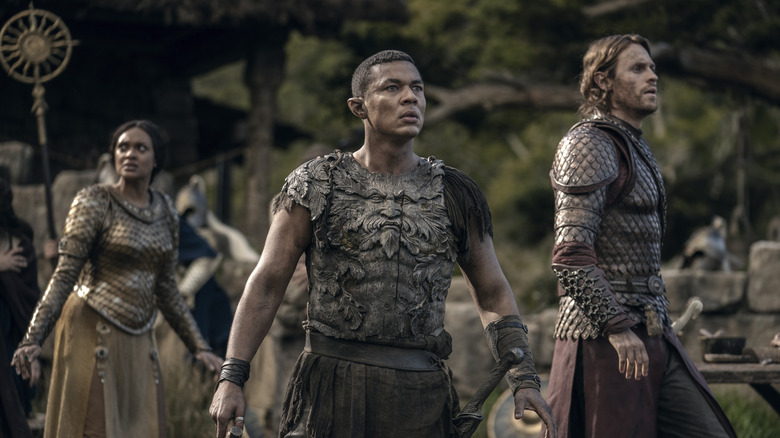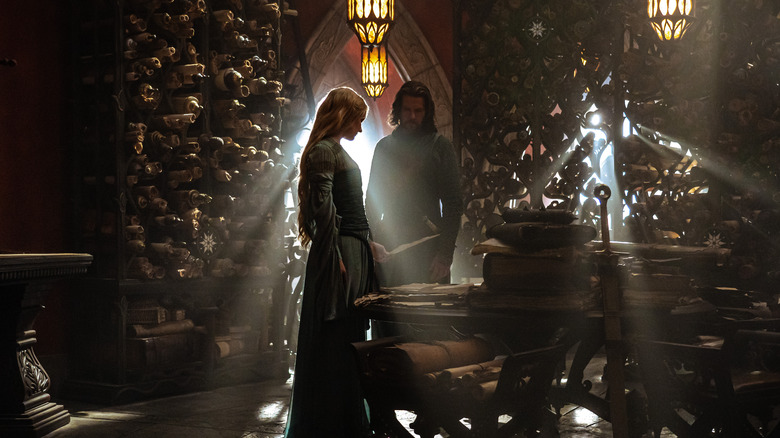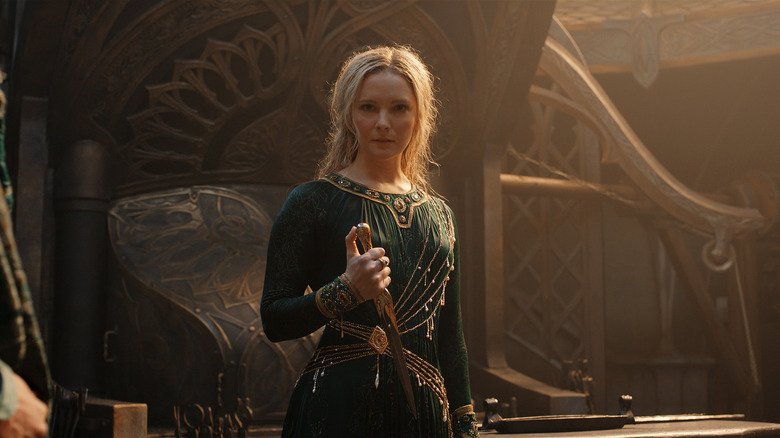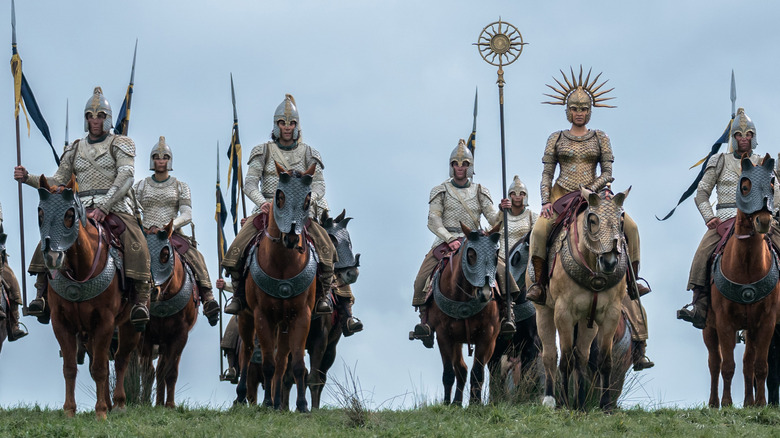I've Read LOTR Dozens Of Times & Unhappy Tolkien Fans Should Give Rings Of Power A Second Chance
Middle-earth runs in my blood.
Growing up, I loved reading, listening to, and watching "The Lord of the Rings" on an endless loop. I discovered Rob Inglis' brilliant narration of the trilogy and "The Hobbit" at a young age, and basically kept the audio rolling on repeat for a solid decade. I can still quote entire sections of the text (with voices), Stephen Colbert-style. My brothers and I would make a point to annually watch the extended editions of Peter Jackson's iconic trilogy in a 12-hour marathon. Before we watched, with Hobbit-like deftness, my wife would create a smorgasbord of Middle-earth-approved dainties, including authentic lembas bread using Tolkien's original recipe.
Like most of my Tolkienian peers, I was nervously excited when I discovered the rights for a televised Middle-earth series were up for grabs. Over the next few years, I covered the run-up to the first season of "The Rings of Power," first with speculation of what might be coming, then with solid facts. I sat down and interviewed cast members, had personal talks with the showrunners and Amazon Studio's Jennifer Salke, and generally got amped up for the upcoming adventure.
Then, to my horror, the release of the show became yet another cultural proxy war. Overly vocal social media personalities polarized the fan base, creating a decidedly mixed response.
Since then, we've had some time to digest things. I'm fully willing to admit that what we've seen so far isn't perfect. And yet, when you step back, what JD Payne and Patrick McKay have managed to create is truly something special. For all the doubters and the (much smaller group of) downright haters out there, here are a few of the reasons I think you should give the series a second chance.
The pandemic effect is a thing, guys, and it impacted Rings of Power
Yes, I'm coining the phrase right here, right now. The "pandemic effect" is that never-ending ripple of disruption that started in early 2020 and continues to percolate through every aspect of life. Even three or four years out, we're still seeing the impact everywhere — including in the film industry. The thing is, Season 1 of "The Rings of Power" dealt with more than just the ripple effect of the pandemic. It took the initial brunt of the devastating event right on the chin.
The show was just two episodes into filming when the entire production shut down in early 2020. It wasn't until late September that filming resumed. Even then, production doubtless went on in fits and starts, as was the case across the industry as overwhelmed post-production crews tried to whittle down the backlog of work that had built up during the early days of the pandemic.
I'm not trying to use the pandemic as a scapegoat here. It isn't a catch-all for every concern or poor decision made by the show's creative team. But there's no doubt that it impacted a lot more than viewers may have realized, especially by the time audiences sat down to watch the premiere over two years later. And "Rings of Power" didn't even have the "let's incorporate current events right into our plot" option like other shows did. Apple Plus's "Mythic Quest" filmed entire episodes on video chat. NBC's "This Is Us" similarly tied the pandemic into multiple scenes, as characters maintained social distances and wore masks. Not so in Middle-earth. The end product needed to look pandemic-less, no matter what went on behind the scenes, which is a challenging hoop to jump through.
Acting in Middle-earth takes chops, and the Rings of Power cast pulled it off
I've got a lot to say about the dialogue issue, but before we get there, I want to point one more thing out. Acting in Middle-earth is tough. Delivering archaic lines in an epic, Tolkenian context isn't easy — even if beloved personalities like Ian McKellen and Viggo Mortensen make it look as natural as breathing.
Depending on where you are and what story you're in, Middle-earth is presented as a relatable, down-to-earth place or a rough-and-tumble feudal landscape. The narrative shifts from quaint Hobbit talk to epic military sequences and high-minded speeches. The charge of the Rohirrim makes me cry every time I experience it, yet it reads like a Bible passage — stiff, archaic, and dripping with melodrama.
When it comes to "Rings of Power," it's a big ask for anyone to slide into the role of a Noldorin Elf or a Númenórean queen and simply play their parts. It takes a deep understanding of the source material and a hard-to-find comfort with the context of each character — something that the current cast has clearly invested in. For example, Lloyd Owen, who plays Elendil in the show, dug all the way down to the "Notion Club Papers" — an obscure and abandoned piece of Tolkien's writings — in his preparation for the show. When I interviewed Robert Aramayo — who delivers a compelling portrayal of a younger Elrond — he was brilliantly up-to-date on his Tolkien lore and kept up with my deep-cut references at every turn. Others, like Morfydd Clark (Galadriel) and Ismael Cruz Córdova (Arondir), have provided impressive characters with stoically immortal dialogue interrupted by poignant moments of emotional clarity — something that is very Tolkien. These guys and gals really have done their homework.
Only Tolkien can really write like Tolkien, so give the show credit for trying
Now, when it comes to dialogue ... I'll let myself get a little nitpicky. As a self-proclaimed professional writer (don't judge my writing too harshly, guys), I've spent decades obsessing over and memorizing Tolkienian manuscripts, and I'll tell you what: I would never want to have the job of writing original lines in his archaic style.
The man was a genius — the kind that you can only get if you combine brilliance with a lifetime spent reading epics like "Beowulf" and "The Kalevala." He was also an Oxford professor, a linguist, and a philologist. He read books in other languages for fun ... and even translated them, just for personal enjoyment. In the foreword to the second edition of "The Fellowship of the Ring," he even confesses that his entire fantasy world was, in his words, "Primarily linguistic in inspiration and was begun in order to provide the necessary background of 'history' for Elvish tongues."
Talk about an oversized tangential part of a pet project.
What am I getting at here? Basically, that it's hard to write original lines for Middle-earth characters, and that means non-Tolkien dialogue is going to sound awkward at times. If you can't craft each sentence just right, it ends up sounding like it was spoken by a 19th-century schoolteacher or a misplaced character from a Jane Austin novel. Peter Jackson's writing room, populated by venerable individuals like Fran Walsh and Philippa Boyens (whom I deeply respect), were able to avoid this issue by pulling lines straight from Tolkien's own pen. They would even tweak them and give them to other characters, like pre-packaged goods or interchangeable parts. That wasn't an option for the setting of "Rings of Power."
The Rings of Power's writing room was fighting an uphill battle
Compared to Jackson's "Lord of the Rings" trilogy, which occurs at the end of the thousands-of-years-long Third Age, "The Rings of Power" story takes place early in the Second Age, where Tolkien gives us minimal story details and practically no dialogue. This left the writers' room to forge their own path. And while I think there are certainly some awkward moments in the script, the more I rewatch the show, the more I personally think they did a remarkable job mirroring the spoken dialogue in Tolkien's world.
Again, this understandably comes up short at times. There are lines that come across as tense, wooden, or verbally clumsy. At times, archaic phrases jump out, throwing off the viewing experience and making it hard to remain fully invested in the emotional gravity of each scene. However, let's give credit where credit is due, because this isn't a constant problem throughout the show: It just stands out when it does happen, especially with the more regal characters, like those from the ancient Elvish kingdom of Lindon or the lavish Mannish kingdom of Númenor.
This is a problem that I think is going to dog any and every new Tolkien adaptation coming down the pipeline. It doesn't matter who's making them, who's in the writers' room, or what story they're adapting. Anyone who needs to reproduce Tolkien's dialogue style is fighting an uphill battle. Using it as a primary point of criticism seems a bit pointless, especially for anyone who wants to watch (and enjoy) more Middle-earth adaptations in some form or another in the future.
Disconnect from the white noise, and embrace Rings of Power for what it is, not what you wanted it to be
The last point I'll make is that critical viewers need to disconnect from the white noise before rewatching the series.
Tolkien's fanbase is multi-national, multi-generational, and includes individuals from every walk of life. The inclusivity of Tolkien fandom is wonderful, but the diversity of thoughts and opinions also set the stage for toxic and aggressive culture wars the moment a series was announced. Many with a bone to pick began using "Rings of Power" as a way to vent harsh criticism — much of which, I feel, was formed well before any genuine judgment could be made.
I'm not overlooking the other side of the coin here, either. There were many who unapologetically praised the series, no matter what they saw. But right now, I'm talking to the skeptics: I challenge you. Take a step back and watch the series simply as a Tolkien fan. Don't drag preconceived ideas or third-party opinions into the picture. Watch, enjoy, think of what drew you to Tolkien in the first place, and judge the show based on those merits. If you can do that, you'll maybe find that giving the series another chance is worth it.
I'm not a "Rings of Power" apologist. The show still needs work. It needs to scale its narrative now that it's free from its pandemic shackles. It needs to focus on fewer stories for longer periods of time, too. But let's not overlook the fact that Season 1 was impressive, folks. It represents the incredible, heartfelt investment that only genuine Tolkien fans could pour into an adaptation.
Now, can they build on this initial momentum for Season 2? Personally, I'm excited for what's to come.
